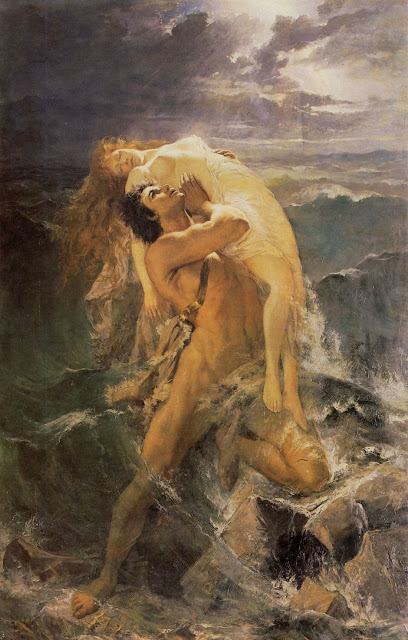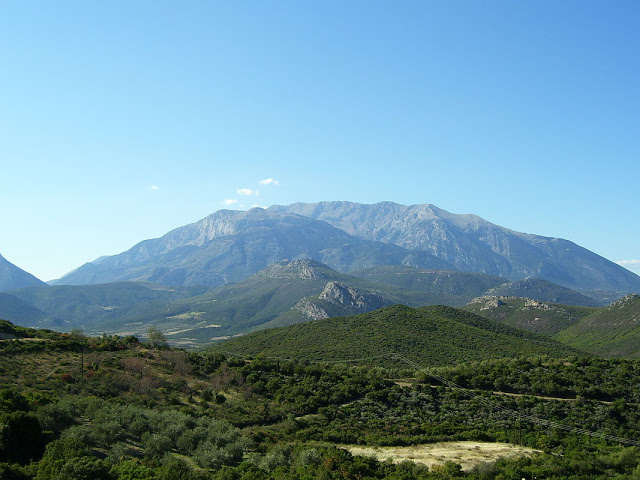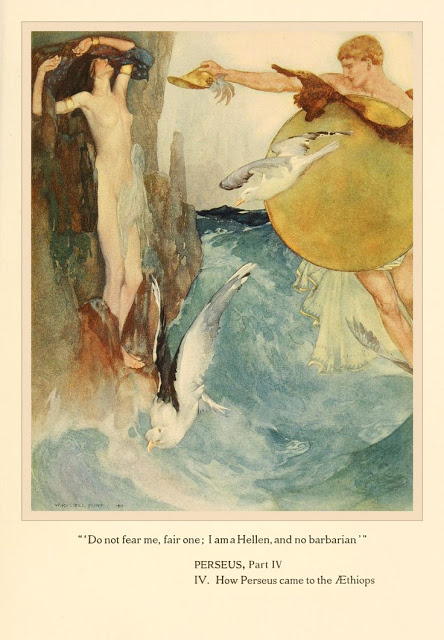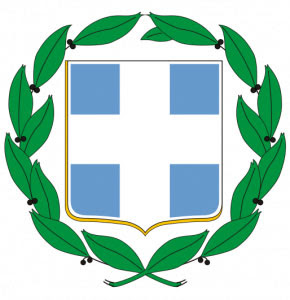Why is Greece called Hellas and Who are the Hellenes?

Hellas – By beanve on Deviant Art
How did Greece come to be called Hellas (Eλλάς- Ellás, Eλλάδος- Elládos), and who are the Greeks?
The who, what, when and where, when talking about the Greeks, could go on forever, I want you to read this post, not send you to sleep, so, here is the long and the short of it!
Anyone who spoke the Greek language was considered Greek, so said the ancients, (So, you see, I’m “Greeker” than I thought!).
The first Greek speakers
Here’s a crazy but true fact about the ancient Greeks: many thousands of years ago, in ancient times, when Greek was the most common language spoken, to the Greeks, who thought themselves a cut above others, any other language, to them, sounded like “bar bar bar”.
And so, to these heathens, to anyone who did not speak Greek, they gave the name barbarians, because they were just so, well, just so barbaric!
And that is where we get the word barbarian, originally meaning anyone who did not speak Greek!
The first Greek – speakers were the Mycenaean Greeks, who originated way back in the Neolithic (15,200 BC – 4500 and 2000 BC) or Bronze Age (3300 – 1200 BC) and Greek was, of course, spoken in the Greek colonies which sprung up along the shores of the Mediterranean and Black Sea but which mainly centered on the coast of the Aegean and Ionian seas.
The Deucalion Deluge – Greek mythology

“The Flood” – Deucalion and Pyrrha, the only survivors of the Greek Deucalion deluge by Paul Merwart
According to Ovid’s “Metamorphoses”, after the “Deucalion Deluge”, a terrible flood in Greek mythology, (of which there are three; the Ogyges deluge, the Deucalion deluge and the Dardanus deluge), similar to the story of Noah and his Ark, or The Epic of Gilgamesh, the Greek civilization was wiped out, leaving only two survivors.
The two who made it through the “Deucalion Deluge” were Deucalion, son of the Titan, Prometheus, creator of mankind (Greek mythology), who later gave them fire and Pyrrha, daughter of Pandora, the first woman to be created by the gods.
.jpg)
‘Pandora’ 1878 Dante Gabriel Rossetti (1828 – 1882). Mother of Pyrrha
Deucalion, ruler of Phthia, an ancient city of Thessaly, central Greece, was warned by his father, Prometheus, that the big rains were coming, and advised him to be prepared; build a wooden chest (Ark?), stock up on provisions and hope for the best.

Deucalion and Pyrrha riding out the Greek Deluge and hoping for the best.
Sure enough, the heavens opened, Deucalion and his wife, Pyrrha, took refuge in the chest he had put together and proceeded to be thrown around in turbulent seas for the following nine days and nights, before finally running aground on the highest peak of Mount Parnassus, which overlooks Delphi in central Greece.

Mount Parnassus. Source wikipedia
(Other variations on this story have the couple running aground on Mount Othrys, Thessaly, or Phouka, Argolis, today named Nemea)
The first ancient Greek tribes and creation of Hellas
So relieved to be back on terra firma, Deucalion and Pyrrha, would agree to anything asked of them and so complied, when ordered by Zeus (King of the Greek gods), to throw stones over their shoulders, which instantly became people, the stones thrown by Deucalion became men, and the ones thrown by Pyrrha, women, who went on to repopulate Greece.
From this story comes the Greek word for people; λαός (laós) m (plural λαοί), which derives from the word “laas”, meaning a stone.

Hellenes. Illustration Johnny Shumate
Of the couple’s many children, (or should I say stones?) the first was a son, Hellen, or Hellinas, (Not to be confused with the great beauty, who launched a thousand ships, Helen of Troy).
Hellen eventually had many children himself, including Aeolus, leader of the tribe of Aeolians, Dorus, leader of the tribe of Dorians, Xuthus, leader of the tribe of Achaens and Ion, leader of the tribe of Ionians.
These ancient Greek tribes conquered ancient Thessaly, and other Greek cities, and the people of these conquered areas came to be known as “Hellenes”, and their territory, “Hellas” (Ellas-Ἑλλάς).

Illustration William Russell Flint
“The Heroes (or Greek Fairy Tales for My Children) By Charles Kingsley
And so, Greeks were known as the “Hellenes” of “Hellas”, until the onset of Christianity (The Byzantine period), when the name “Hellenes” smacked of pagan rituals, idolatry, a belief in Zeus and the worshiping of the twelve gods of Olympus.
![Mount Olympus Thessaly – Home of the twelve Greek gods. 2,917 m (9,570 ft)] the highest mountain in Greece.](https://greekerthanthegreeks.com/wp-content/uploads/2017/10/Thessaly, Greece.Mount Olympus [2,917 m (9,570 ft)] is the highest mountain in Greece..jpg)
Mount Olympus Thessaly – Home of the twelve Greek gods.
2,917 m (9,570 ft)] the highest mountain in Greece.
Origins of the word Greek
“What shall I do with these heathen Hellenes?”, asked Theodosius I, Roman Emperor from AD 379 to AD 395, who, in 380 he proclaimed himself a Christian.
“I know” said Theodosius, answering his own question, “From now on, the Hellenes shall again be known as “Romaeos”, as they were called by the Romans.” (Virtually all Greeks, after 212 AD, were under Roman rule).
After the fall of Constantinople in 1453, the “Hellenes”, under Turkish rule until 1821, were largely known as Romaeos, Graecus and Gracus, by non-Greeks and came from Graecia, “The land of the Greeks”.
By the early 20th century, over half of the Greek-speaking population was settled in Asia Minor (Turkey), later, that same century; many Greeks migrated to the United States, Australia, Canada and elsewhere.
Today the population of Greece, which since 1973 is officially called “The Hellenic Republic”, is about ten million, and they are known as Greeks in English-speaking countries.

The emblem of The Hellenic Republic by Kostas Grammatopoulos. Adopted on June 7 1975
Greeks are known as Yunan, from the old Persian Yauna, for the Ionian Greeks living on the West coast of Asia Minor, the first Greeks the Persians ever came across, and Yevanim in Hebrew, Turkish and Arabic and Berdzeni by the people of Georgia (A country in the Caucasus region of Eurasia).
For the Greeks though, they will forever be called Hellenes, and their country is Hellas – Ellas-Ἑλλάς
The poem Hellas, written by the true philhellene
Percy Bysshe Shelley 1792–1822
‘The world’s great age begins anew,
The golden years return,
The earth doth like a snake renew
Her winter weeds outworn:
Heaven smiles, and faiths and empires gleam
Like wrecks of a dissolving dream.
A brighter Hellas rears its mountains
From waves serener far;
A new Peneus rolls his fountains
Against the morning star.
Where fairer Tempes bloom, there sleep
Young Cyclads on a sunnier deep.
A loftier Argo cleaves the main,
Fraught with a later prize;
Another Orpheus sings again,
And loves, and weeps, and dies.
A new Ulysses leaves once more
Calypso for his native shore.
Oh, write no more the tale of Troy,
If earth Death’s scroll must be!
Nor mix with Laian rage the joy
Which dawns upon the free:
Although a subtler Sphinx renew
Riddles of death Thebes never knew.
Another Athens shall arise,
And to remoter time
Bequeath, like sunset to the skies,
The splendour of its prime;
And leave, if nought so bright may live,
All earth can take or Heaven can give.
Saturn and Love their long repose
Shall burst, more bright and good
Than all who fell, than One who rose,
Than many unsubdu’d:
Not gold, not blood, their altar dowers,
But votive tears and symbol flowers.
Oh cease! must hate and death return?
Cease! must men kill and die?
Cease! drain not to its dregs the urn
Of bitter prophecy.
The world is weary of the past,
Oh might it die or rest at last!’
Related posts:
How the Aegean Sea of Greece Got its Name: A Wonderful but Sad Greek Myth
How the ancient city of Athens got its name and the sacred olive trees of Greece.



